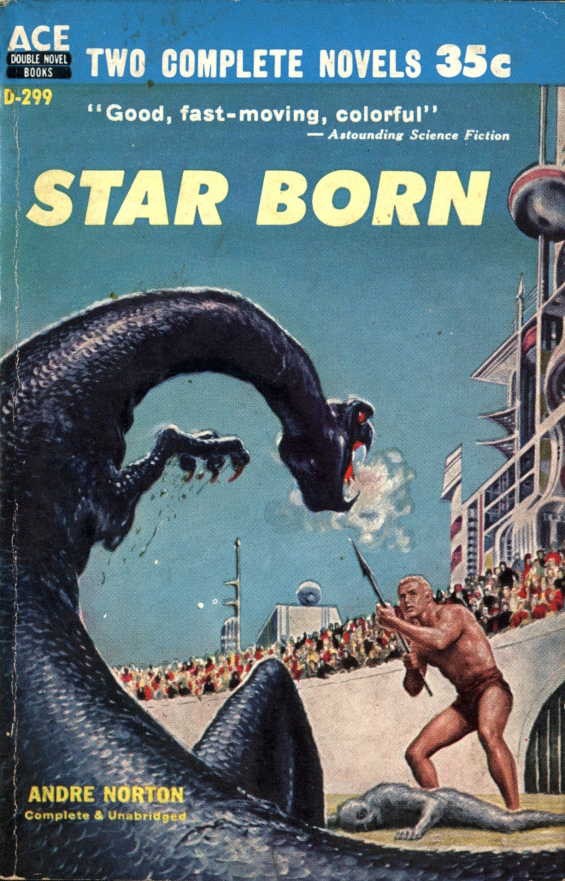
The SFFaudio Podcast #759 – Star Born by Andre Norton, read by Mike F. Smith (for LibriVox.org). This is a complete and unabridged reading of the book (6 hours, 34 minutes) followed by a discussion of it. Participants in the discussion include Jesse, Paul Weimer, Trish, and Alex (PulpCovers.com).
Talked about on today’s show:
1957, Ace Double, H. Beam Piper’s and John J. McGuire Planet For Texans, which one would you like better, memories of H. Beam, great elements, a better book vs. more fun, action, courtroom scenes, sitting around the campire expressing philisophical opinions, too much plot, too many characters, 2 humans, a supporting cast of other space men, 2 different mermen, on the cover, the new mermen, a lot of men, not a lot of wo-men, merladies, female characters, we mention mating, brightly clothed the others women, escorted to the arena, a line of mermen, the mom dragon creature with its babies in the arena, two arena scenes, vast audience, gladiatorial combat in ancient Rome, half full stadium, aliens are the natives, genetically uplifted, slaves, Doctor Moreau them, consciousness raising, experimental animals, more docile, a fairly fun book, developing the world, this is not the first book in a series, The Stars Are Ours, a sequel, Trish liked this book a lot, horrible disappointment with Star Hunter, hate all her stuff, the ethical questions, Raf Kirby, mental journey that he goes on, politicking, distrust of his own crew, they’re all weird, come from the culture, the Pax is overthrown, they’re the Federation now, descendants of the Pax, his bloodknife brother, way more star of the story, they’re on a manquest, different culture, assisting him with a lifequest, tightly knit, partners, telepathically communicate, talk to the animals, squirrels, understanding the concept trade, this is a culture that is integrated into its ecosystem, hunting and gathering, Rafe, covered in gear, bombs in his chest, guns, rocketpack, flitters and bases and tech, do you have a friend?, no, I don’t, she doesn’t cook this enough, a critique of machine culture, H.P. Lovecraft, regimentation, titles and orders, settle on this planet?, go back to his spaceship, we’re us you’re you, come back and see us in a few thousand years, an adventure, he got to go home, nine missions previously, not really volunteers, space navy seals, fled a bad culture, still the case, a Herman Melville style native vs. capitalism culture, Rafe and Dal, one syllable with an A in the middle, the ecology, the geology, the geography, a little better, randomly tossed together, loose ends, small explanations, it having a prequel, she invented that other culture and world first, four grandfathers ago, at least 100 years, cryosleep, Earth has moved on, hyperspace tech, they’re warpin, a slow trip, at least 200 years later, all the richer, ancient dead society that’s not so dead, past glory, Rome is explicitly called out, 6th or 7th century Roman empire, Justinian comes in from the east, Rafe’s world, they come from cities, Homeport is a village in a ruin, she sketches everything, the closest to concrete details, the merman’s fur it gray with rainbow tips, they’re otter people, they’re furry, iridescence, it’s cool, the world’s cool, go deeper, a contemporary review, Galaxy, January 1958,by Floyd C. Gale, workmanlike, sequels demand comparison, a solid interesting story, Earth’s dictatorship, a degree of telepathic ability, Dalgard Nordis, the normal matriculating exploration, strange activities, capital t capital o, Jesse’s problem with the book, all the parallels, a high culture, crushed by its own craziness, abandoned its technology, hunter gatherer with a taboo against high technology, a plot moving characters around the stage, that’s kind of all there is, there’s more to talk about, how terrible that captain is, draftee, just got training, slaps Raf down, wrong keywords, I guess cuz they’re aliens, that’s the evil culture, representing the horrible culture that he’s coming from, the philosophy may be in the right place, delegitimating other peoples because they’re not your own, burned up and flamed out, they’re not men, a fire and tools rule, carrying spears, a big hypocrite, a terrible captain, self ordered exploration, no reprimand, going off with that warrior, immediately embroiled in local politics, let’s get involved in this land war, the Prime Directive from Star Trek, ignore the contradiction, the enemy we have to guard against, the one bright idea, the recording device, let’s run it through the ditto, backup tapes, here’s a human looking captive, did Andre just forget about it, this book the result of that recording, all that stuff, he should’ve gone native, this is a juvenile, two juvenile, loincloth vs. spacesuit, adult role, he needed to go through a Heinlein novel first, strong opinions, some ethical system he’s imposing, get away from that society, there’s no girl to seduce him, no merlady, recasting Dal as a girl, gender flip somebody, the aquaman, cross species romance, carrying through unresolved sexual tensions, rishathra thing from Ringworld, mules or something, Apple TV, a Discworld, unrecognizable Ursula K. Le Guin, unnatural in some way, they’re from the land, their whole species, later Romans are always cast as decadent, a lack of nuance, mustache twirling, I can solve this, a young juvenile from the others, her solution is add another character, what does Raf contribute?, bombs, the outside perspective, down with Dal, if I could skip each Raf chapter, adding a couple inches to the map, this book needed a map, helps to display interesting similarities, hate sleeping inside this alien city, being shutup in buildings, reflexive xenophobic instinctual, an adopted prejudice, bad vibes, why was he so immediately alarm bells, plot that needs to happen, an argument, the heebee jeebees, a lot of showing, no Heinleinian lectures, ancient race, very cool, internal reveal, a conflict between Dal and Rad, fighting over a mergirl, a mermaid if you will, Four-Day Planet by H. Beam Piper, nice little infodumps, better than Lone Star Planet, people arguing for positions, a newspaperman cannot offend everybody in the community, presenting characters who the reader can identify with, snarky or excited or religious or something, just has a furry coat, she needs some chip on her shoulder, forced character development, allow the reader to project themselves, the characters are palish, even Nancy Drew, she has no strong stuff, she’s always making sandwiches for people, behind it all she’s the girl detective, mysteries, do whatever you want with her, blank slate, she has a skirt and flashlight, juvenile literature, she’s not a cipher, nobody he’s sweet on, secret passion for his merboyfriend, always the loner, any kind of a personality, writing quickly?, cranking these books out as fast as they could, keep the secret of the this colony, protect them from the Federation, here be dragons on the planet, quite literally, that’s a mistake, taking a lot on himself, when they’re all telepathic, his telepathic wife, council of elders, one person keeping a telepathic secret, Raf’s reasons, Dalgard feels more like arrogance, next time they see a rocket, a mistake not to share this information with his people, the evil Pax, isn’t Ssuri in on some of this, Merguy number 2, there for the rocket, protect the people here, she’s doing a lot of symmetrical stuff, how old do we think he is, 14, 15, 16, 18ish, a callow 18, 16-18, maturity at a younger age, Star Trek: Enterprise, Cogenitor, a nice solar sailing cruise, enslaved another race and uses them for reproduction, terrible trouble, when they pick him up, he blew up some of the artifacts, keep the deal, lost from the expedition, his dead armor with a hole in it, charred helmet, some blood, hating because it is powerful, surely they’re going to revisit this, not a well loved show, the most notable thing about Enterprise, the movies that Tucker chooses to watch, Picard’s holodeck, a holodeck serial, what movies are on the harddrives of the NX-01, there weren’t that many episodes that were good Star Trek episodes, Ensign Ro, made Deep Space Nine a show, Kira instead, what if you’re wrong, Federation?, the Maquis, an undercutting of the main thing, integrated instantly, Captain Chakotay, so much to explore there, political distrust, a crew vote for captain, your pirate thing, upset with a Federation decision, we should raise the age of consent or retirement, whoever it is, cede territory to avoid a war, integrated into the Cardassian culture?, how rich that paid off, why Voyager is not as good as Deep Space Nine, Quark doesn’t play the game, embraced the tensions, arcy stuff, the Cardassian tailor, J’kar is the other show, Babylon 5, this needed some of that, too stiff, danced around it, vestigial sense of duty, I’ve changed my mind, doing this as a Tom Cruise movie, go against the IMF, use the blast bombs for the second time, the cache of artifacts, invaded the city with a strike team, there was no music swelling or dramatic pause, Andre Norton’s famous books, Voodoo Planet, Beast Master, The Beastmaster (1982), a barbarian, John W. Campbell’s evil influence, telepath vs. cyborg, her big legacy, a sad legacy, the very 1st D&D novelization, Witch World, the great filter, over time people and things fall by the wayside, Robert W. Chambers, a new King In Yellow movie on Amazon Prime, there goes Trish’s semi-noisy keyboard, terrible metaphor, lacks some pepper, lacks some heat, not making it spicy, benefit with adaptation, Rings Of Power, not executed, gender flip some furry people, change the ending, The Demon Breed by James H. Schmitz, a mostly water based world, female scientist and her intelligent otter companions, tool uses, foil the invasion by extensive knowledge of the environment, a great book, The Witches Of Karres, no psychic powers, Uplift series by David Brin, otter people, a natural for uplift, they hold hands, if you are choosing species to uplift, humans disappeared, uplifted elephants, weird furry trolls, they otter be more ottery, no audible audibooks for Schmitz, Legacy by James H. Schmitz, ancient living machines, A Tale Of Two Clocks, skilled in every martial art, a chilling notion, the plasmoids, an excellent narrator: Winston Tharp, mostly does poetry, Lion Loose by James H. Schmitz, the Lion House, a lesbian pulp fiction novel, October 1961, guy with a cigarette and a long pony tail, judging a story by the art, anything he records, problematic stuff, the sexister the better, let’s talk about Gor, a long running series, the covers are really good, simplified map of known Gor, do they exist as audiobooks, John Norman, book 37!, 35 hours, we’re safe, Gorean saga, really overselling it, terrible horrendous art, random stock art put a sword on it, some person riding a giant eagle, a tarn, one guy, a professor of decorum, professor of philosophy, in defense of ethical naturalism, nudity?, the logic of the open question argument, publishing the wrong things, working out your psychology, Heinlein’s is pretty scary, deep issues, he’s 91, longer in science fiction, more than 20 Tarzan books, other books where Tarzan shows up, cross overs, the Barney Of Beatrice series, Joe R. Lansdale, The Mad King, the Tarzan literary universe, they’re trying to beat Norman, 26 by Burroughs, they get longer and longer, that’s not the crazy part, 28 hour book, Ralph Lister has a helluva workout, happy Ralph Lister?, what the first Gor book is about, counter-earth, a princess, war aircraft bird, semi-feudal city states, the slavery becomes the main theme, weird slave fantasies, wow!, I’m a sex slave now, that’s crazy, a market for it, tiresome after a while, 1966, Burroughs pastiche, sexier, a Gor book from 1966-1988, almost every year, amazing, a helluvan output, a model dressed as a kajira, cosplaying gor, classifications, a plethora of types by virginity types, by employment, save Jesse from himself, new weird things, it exists its fine, so hard so fast, a gothic romance book, you have to have a castle and a lady running away and a high light in the window, yelling at Jesse about Gor, the reputation, endorsing by damning, weirder and worse, an impressive series, The Shadow, Walter B. Gibson, it makes him look like his other brother, the nose is part of the mask, hero pulp characters, backstory, very descriptive, from the pov of others, a force of nature, he’s never the narrator, is this his real identity, Lamont Cranston is a real guy, a rich playboy, impersonates him, you were here last week, Liam Neeson, Darkman (1990), Sam Raimi, a great premise, an origin story movie, scientist or something, do amazing stuff, a review of Darkman by Red Letter Media?, Frances McDormand, the romantic lead, two sequels, Armand Assante, he has no face, dramatic I’ve got cancer heroes, Rob Roy (1995), now just action roles, ice road trucker, The Gray (2011), assassin on the Mexican border, Stallone’s career, stick around long enough, a lady falling from a high tower, all the Spider-Man movies, people got their fetishes, Alfred Hitchcock, Quentin Tarantino’s feet, blonde lady and handsome guy with dark hair, The Spider, Will Murray, the guy who invented Squirrel Girl, straight 1930s pulp style, a cloak and a hat, carries a gun, indistinguishable, what a trick, essentially identical, Spider Fury And Steel, Doc Savage meets King Kong, The Spider: Fury in Steel, Billy Zane, The Phantom, great grandpa was Tarzan, 400 years of history, this immortal, the ghost who walks, weird 90s pulp revival, The Rocketeer (1991), female air pirate, weird lesbian subtext, perfectly understandable, action sequences, Treat Williams, Xander Drax, he’s a treat, Deep Rising (1998), action heist movie turns into towering inferno with a Cthulhu monster, Famke Jansen, Anthony Heald, Wes Studio, that didn’t take long, John Carpenter, that vibe, 45 million dollar budget, before we have to go, ocean going heist movie, Out Of The Dark by David Weber, dog-like aliens from space, submit, space-dogs, Footfall by Larry Niven and Jerry Pournelle, guerrilla warfare, the Battle of Agincourt, Harry Turtledove, Dracula shows up, Vlad the Impaler himself, the title reveal, double meaning, glass the planet, two books in the series, Into The Light, co-author, 381 pages, 16 hours, alien invasion until the very end, because he’s Dracula, Honor Harrington, a lot of those, the Moon is secretly a death star, 1966, a different series, a solid week, The Tall T (1956), based on an Elmore Leonard novel, Randolph Scott, Henry Silva, ave Gun, Will Travel, somebody Boone plays the badguy, neighbourly, she’s the daughter of a rich farmer, ransom, you can feel the Elmore Leonard on the screen, Glitz, painted cover art, lady fleeing from a high estate, doing a Hans Gruber, a Gothic Romance, that counts, a Markie Post/Jimmy Smits movie, sounds good, even tho they’ve rebooted that show, Daniel Krouse original, perfect hair, not running exactly, fleeing, moving rapidly away, this is a gothic romance and we need to do a show on it, invested in some very weird things, William Shatner, a musician, and Stephen King, Chadwick Boseman has a bluechek in case he comes back to life.

Posted by Jesse WillisBecome a Patron!





 In Enemy Hands (Honor Harrington #7)
In Enemy Hands (Honor Harrington #7) Crown of Slaves (Honorverse: Wages of Sin #1)
Crown of Slaves (Honorverse: Wages of Sin #1) More Than Honor (Worlds of Honor #1)
More Than Honor (Worlds of Honor #1)